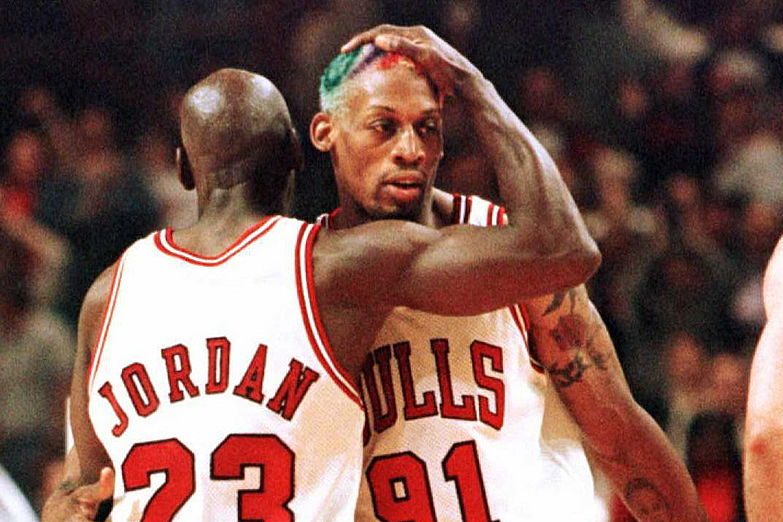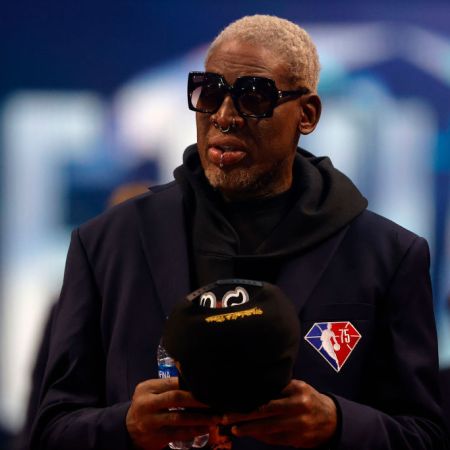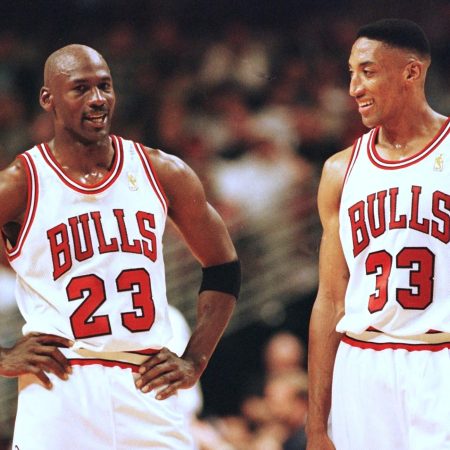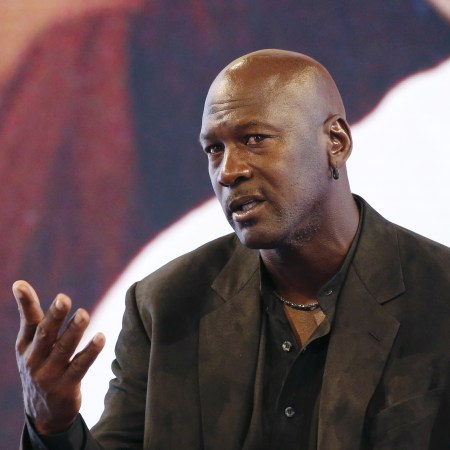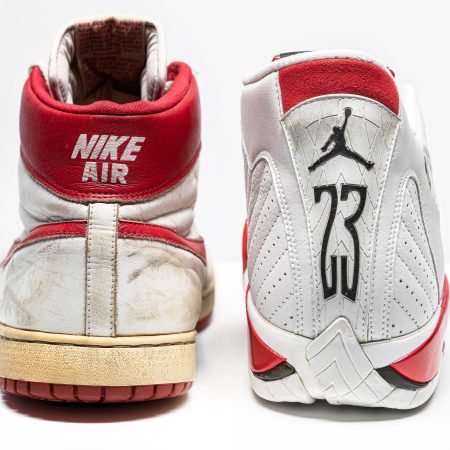The first two episodes of ESPN’s 10-part Michael Jordan docuseries The Last Dance gave us a “traveling cocaine circus,” “former Chicago resident” Barack Obama and Jordan’s constantly full whiskey glass. But the third and fourth installments of the show didn’t miss a beat, giving fans who are starving for sports content in quarantine plenty to talk about — from Vegas debauchery to Phil Jackson’s experience with hallucinogenics and Jordan’s long-burning hatred of Isiah Thomas.
We all love a good rivalry, and Sunday’s batch of episodes didn’t disappoint there, chronicling the bad blood between the Bulls and the Detroit Pistons. But it also focused on conflicts within the team, like Jordan’s hesitance to embrace Jackson’s philosophy after working with Doug Collins and the questions over how Rodman — a former Piston — would fit in on the Bulls. (The answer? “Like a hand in a glove,” according to Scottie Pippen.) These are the biggest revelations from Episodes 3 and 4 of The Last Dance.
That time Carmen Electra hid from Michael Jordan in Dennis Rodman’s room
Episode 3 focuses primarily on Dennis Rodman and his role on the team, and naturally, that includes his off-the-court antics. Jordan describes how Rodman kept it together and assumed a leadership role while Pippen was out recuperating from his offseason surgery, but as soon as Pippen returned in January 1998, the Worm requested a vacation to go blow off some steam in Las Vegas.
After some negotiating, Phil Jackson agreed to let him spend 48 hours in Vegas (as Steve Kerr explains in the doc, “Dennis was bizarre, but I think what made it work was Phil and Michael’s understanding that to get the most out of him on the court, you had to give him some rope. And, um, they gave him a lot of rope”). But — surprise, surprise — Rodman exceeded his allotted 48 hours in Sin City, forcing an irritated Jordan to get on a plane, go to his hotel room and personally “get his ass out of bed.”
Jordan demurs about the state of that hotel room in the doc, saying, “I’m not gonna say what’s in his bed, or where he was, blah blah blah,” but Rodman’s girlfriend at the time Carmen Electra is, thankfully, a little more forthcoming. “There was a knock on the door,” she says. “It’s Michael Jordan, and I hid. I don’t want him to see me like that, so I’m just, like, hiding behind the couch with covers on me. ‘Come on. We’ve got to get to practice.’ ”
Despite his off-the-court hijinks, however, Rodman was an elite player who earned Jordan’s respect. MJ recalls getting upset at Rodman for getting tossed from a game and receiving a non-apology from him after the game that was meaningful nonetheless. “I went to Michael Jordan’s room for a cigar, but what I think he knew the fact that, you know, that I think that was my way of showing him, ‘My bad!’” Rodman explains.
“He didn’t say an apology,” Jordan says. “He didn’t say anything. But by him coming to my room, it was his way of saying, ‘Man, I fucked up.’ And from that point on, Dennis was straight as an arrow.”
Jordan doesn’t seem to be over Pippen’s “migraine game”
One of the most fascinating moments in Episodes 3 and 4 comes when producers bring up Scottie Pippen’s “migraine game” — when the Bulls lost Game 7 of the 1990 Eastern Conference finals to the Pistons, partly because Pippen’s play was affected by the fact that he was suffering from a migraine. When it’s first mentioned, there’s a pregnant pause before Jordan eventually offers a pained smile and simply says “Yeah,” then licks his lip.
Later, he says all the right things — sort of — but his tone and body language indicate that he’s still pissed that Pippen wasn’t able to push through the pain. “He said he had a migraine,” he says, throwing his hands up. “I can’t argue the point that he had a migraine. It was just one of those things that you know, it’s so unfortunate.”
Pippen says in the episode that the migraine was so bad that he couldn’t see. (“I was just blinded. I couldn’t see,” he says. “I couldn’t focus. I was seeing double, black. I couldn’t get my eyesight.”) It’d be hard for most of us to argue that Pippen should have done a better job and stayed in the game while he was experiencing blindness, but of course, Jordan had his own famous “flu game” seven years later, so we have to forgive him for not quite understanding why other people can’t just drop 38 points while they’re so ill they can barely stand. He’s just made differently.
Phil Jackson once dropped acid and thought he was a lion
Episode 4 is centered mostly around Jackson, from his religious upbringing in Montana (“I would rather be playing sports than on my knees praying,” he says) to his time playing on the Knicks and his coaching stint in Puerto Rico. Naturally, much attention is paid to Jackson’s unconventional approach and his affinity for meditation, Buddhism and Native American philosophies. But we also got this little nugget from Jackson’s longtime friend and writing partner Charles Rosen: the Zen Master once dropped acid in Los Angeles and convinced himself he was a lion, roaring up and down the beach.
Unfortunately there’s no footage of said acid trip, but this other photo highlighted in the episode will give you the basic idea.
It took Jordan a while to come around to the triangle offense
If you know anything at all about Phil Jackson and his coaching methods, you probably know the terms “Zen Master” and “triangle offense,” and episode 4 chronicles the way his willingness to embrace the latter helped Jackson win Doug Collins’s job as head coach. But while he famously told the Bulls in ’97 that he wouldn’t play for anyone other than Jackson, Jordan admits it took him a while to come around to the idea of not constantly having the ball.
“I wasn’t a Phil Jackson fan,” he said. “He was coming in to take the ball out of my hands. Doug put the ball in my hands. Everybody has an opportunity to touch the ball [under Jackson]. I didn’t want Bill Cartwright to touch the ball with five seconds left. That’s not equal opportunity offense, that’s fucking bullshit. So many times Tex would yell at me, ‘Move the ball, move the ball, there’s no I in team.’ Well there’s an ‘I’ in ‘win.’”
Michael Jordan still hates Isiah Thomas decades later
Much of episodes 3 and 4 is devoted to the Bulls’ rivalry with the Detroit Pistons in the late ’80s and early ’90s, thanks in part to the Pistons’ infamous “Jordan Rules” (which John Salley summarizes as “as soon as he steps in the paint, hit him” while smacking his fist for effect). But while getting beat up by the “Bad Boys” Pistons inspired Jordan to bulk up so he could, in his words, “administer pain,” it also left him with a lingering hatred.
“Oh, I hated them,” he says in The Last Dance. “And that hate carries even until this day. They made it personal. They physically beat the shit out of us.”
That hatred is very apparent when the docuseries broaches the subject of the Pistons walking off the court without shaking hands after being swept by the Bulls in the Eastern Conference finals in 1991. Producers present Jordan with a clip of Isiah Thomas explaining that back then “when you lost, you left the floor,” and MJ’s reaction is priceless, proof that no one can hold onto a grudge quite like him.
“Well, I know it’s all bullshit,” Jordan says before even watching Thomas’s explanation. “Whatever he says now, you know it wasn’t his true actions then. You know, he has time enough to think about it. Or the reaction of the public, that’s kind of changed his perspective of it. You can show me anything you want. There’s no way you’re gonna convince me that he wasn’t an asshole.”
After watching Thomas’s explanation, Jordan’s opinion is of course unchanged. “All you need to do is you go back to us losing in Game 7. I shook everybody’s hand,” he says. “Two years in a row, we shook their hands when they beat us. There’s a certain respect to the game that we paid to them. That’s sportsmanship, no matter how much it hurts. And believe me, it fucking hurt. But they didn’t have to shake our hands; we knew we whupped their ass already, we’d gotten past them, and to me that was better in some ways than winning the championship.”
Jordan’s not the only one still harboring some resentment over the Pistons’ lack of sportsmanship, however: “Straight-up bitches,” Horace Grant puts it more succinctly. “That’s what they walked off like.”
His teammates were shocked by Jordan’s emotional response to winning in ’91
The image of Michael Jordan crying while clutching the Larry O’Brien trophy after winning his first NBA championship in ’91 is an iconic one, but The Last Dance provides some new insight, revealing Jordan’s teammates were surprised to see the display of emotion from him.
“Everybody … has the picture of [Jordan in 1989] in their mind when we beat Cleveland on that last shot and he’s punching the air and he’s all excited,” Will Perdue says in the doc. “That’s who we knew, the competitive Michael Jordan, the win-at-all-costs Michael Jordan. Sometimes we questioned whether he was human, whether he had feelings. He was just a guy who was totally focused on one thing. The only emotion we had ever seen out of him was anger or frustration. We were literally stunned to see those emotions.”
The Charge will help you move better, think clearer and stay in the game longer. Subscribe to our wellness newsletter today.
